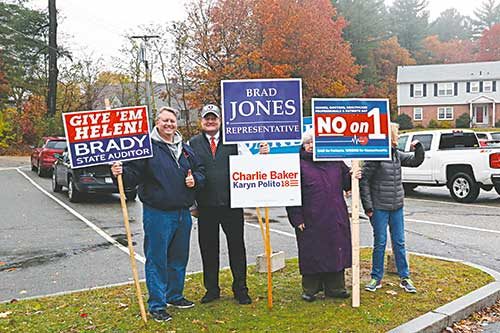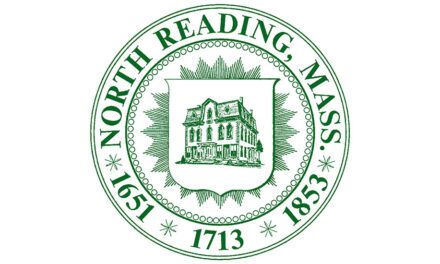Nearly 67% of town’s voters cast midterm ballot
Published November 8, 2018
By MAUREEN DOHERTY
NORTH READING — There were few surprises in Tuesday’s midterm state election among local voters.
No one is surprised that a popular Republican Governor, Charlie Baker, who has garnered 67% of the votes statewide against his Democratic challenger, Jay Gonzalez, in a decidedly Democrat-leaning state would win over the voters of North Reading.
A landslide is the only way to describe the second-term victory for the Baker-Polito ticket, with 5,760 of the town’s voters choosing the incumbent ticket over the Gonzalez-Palfrey ticket, which tallied 1,445 votes. There were also 287 blanks and 20 write-ins cast locally.
[It should be noted that all figures cited in this story are the unofficial results provided by Town Clerk Barbara Stats due to a tight press deadline, but these figures are historically very close to the official results. Also, the statewide percentages cited reflect 82% of the state’s precincts reporting their results as of Wednesday morning.]
Diehl overtakes Warren
One surprising outcome in this election was the U.S. Senate race. Locally, the Republican challenger, Geoff Diehl, beat out the junior U.S. Senator by 72 votes, with 3,580 votes for Diehl and 3,508 for Warren. Independent Shiva Ayyadurai also picked up 274 votes locally.
Statewide, meanwhile, Warren was nearly as untouchable as Baker, garnering 60.4% (1.3M) of the vote while Diehl had 36.2% (796,728) and Independent Shiva Ayyadurai polled 3.4% (72,248) with 82% of the precincts reporting.

STATE REP. BRAD JONES JR. (second from left) campaigns on Election Day with supporters stationed across the street from the town’s centralized polling place at St. Theresa’s Parish Hall. Jones, who is the House Minority Leader, got 5,923 votes locally and was unopposed. (Al Pereira/ Advanced Photo)
Fired up electorate
But the most revealing outcome of this mid-term election has been the fired up electorate. A mere eight weeks ago, just 18.70% of the town’s 11,236 voters bothered to participate in the state primary.
Fast forward to the general state election and North Reading had nearly that many participate in early voting. Over the two-week early voting period, the Town Clerk’s office reported that 18.5% of the town’s voters took advantage of it and just over 48% of the town’s voters trudged to the polls in the pouring rain on Tuesday, bringing the total number of participants in the 2018 midterm election to 7,512 or 66.86%.
At Monday night’s Select Board meeting the members and the Town Administrator praised the Town Clerk and her staff for the efficient operations they put in place to ensure early voting would go smoothly for all involved and deemed it a success.
Questions 1, 2 & 3 drew voters
A big draw to this election was the three ballot questions. This trend was statewide as well as local.
In North Reading, Question 1 – imposing mandatory staffing ratios for nurses at hospitals and most health care facilities – went down in flames, 5,863 to 1,446.
The passage of Question 2 reflects the local electorate’s frustration with campaign money spent anonymously through Political Action Committees (PACs) since the Citizens United ruling by the U.S. Supreme Court.
Locally, 4,707 voters agreed that the influence of money in elections should be limited and further, that corporations do not have the same rights as people, and were therefore in favor of establishing a state commission that would study a potential proposal to be ratified at the state level and eventually ratified by three-quarters of the states (38/50) in order to amend the U.S. Constitution to this effect. A total of 2,515 local voters were against establishing a commission to start this process.
Question 3, which asked voters to affirm with a yes vote that they wanted to maintain a current law that prohibits discrimination on the basis of gender identity in places of public accommodations, a total of 4,630 local voters were in favor of maintaining such protections. Those who wanted this provision in the law repealed totaled 2,702.
The town’s results mirrored the statewide results on these questions:
Question 1 lost by a margin of 70% against and 30% in favor;
Question 2 won by a margin of 71.3% for and 28.7% against;
Question 3 won by a margin of 67.78% who favored keeping the protections in place while 32.3% were opposed to it.
Jones, Tarr
State Rep. Bradley H. Jones Jr., of North Reading, the current House Minority Leader, and State Sen. Bruce Tarr of Gloucester, the current Senate Minority Leader, did not have opponents in the primary or general elections. Both got considerable support from the local electorate. Jones got 5,923 votes and there were 1,544 blanks and 45 write-ins. Tarr got 5,822 votes. There were 1,658 blanks cast and 32 write-ins.
Other incumbents
These incumbents all withstood the challengers who ran against them locally:
Attorney General Maura Healey (4,457) retained her seat against James McMahon III (2,855)
Secretary of State William Francis Galvin will hold on to his seat if local voters have their say, 4,531 to 2,513 while Juan Sanchez got 148.
Deborah Goldberg will remain state Treasurer with 4,153 votes versus 2,743 earned by Keiko Oral and 158 by James Guerin.
For auditor, incumbent Suzanne Bump (3,590) withstood the challenged posed by Helen Brady (2,980), Daniel Fishman (324) and Edward J. Stamas (100).
Congressman Seth Moulton won by a margin of 1,818 votes over his nearest competitor, Joseph S. Schneider, 4,576 to 2,758.
There was a close race for Councillor, relatively speaking. Incumbent Eileen R. Duff received 3,745 votes versus her opponents, Richard A. Baker (2,979) and Marc C. Mercer (207).
District Attorney Marian T. Ryan ran unopposed and received 5,054 votes.
By similar margins, Michael A. Sullivan polled 5,011 votes and Maria Curtatone was unopposed for Register of Deeds (4,947 votes).
Stats from elections’ past
According to Town Clerk Barbara Stats, in 2016, the first year early voting was possible, the town had a total of 3,498 voters participate (30.87%).
“But that election in general attracts more voters (presidential vs non-presidential year), and of course EV was brand new in 2016, so those conditions I’m sure factored in,” she said.
Given the current “media coverage and the political ‘climate’ this year, I am surprised that this year’s early voting was not a bit higher,” she said.
“It was an extremely busy day at the polls from the get-go, with really no break in the action until after 7 p.m. Even the weather did not seem to have any effect on the voters coming out yesterday,” she acknowledged.
Stability in the town’s voting patterns
Going back to 2006, voting in town ebbs and flows in presidential election years, when participation hovers around 80% to 82% versus mid-term years, when it dips below 60% to over 68% as follows:
State Presidential Election 2016: 9,154 (80.77%)
State Election (non-Pres) 2014 : 6,271 (56.97%)
State Presidential Election 2012: 8,800 (80.12%)
State Election (non-Pres) 2010 : 6,650 (68.3%)
State Presidential Election 2008: 8,460 (82.25%)
State Election (non-Pres) 2006 : 6,209 (64.4%).




